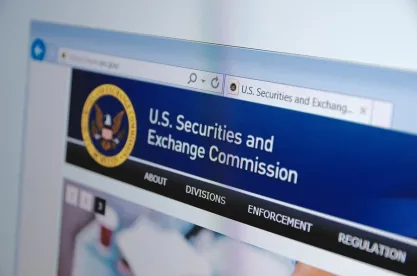On May 14, 2020, the Securities and Exchange Commission (SEC) approved the New York Stock Exchange’s (NYSE) request to make additional temporary modifications to certain shareholder approval requirements during the COVID-19 pandemic, which are similar to recent modifications made by the Nasdaq Stock Market (NASDAQ) (previously summarized here).
Together with the NYSE’s prior temporary relief (previously summarized here), these additional temporary modifications to the shareholder approval requirements are intended to enhance NYSE-listed companies’ access to capital during the COVID-19 pandemic. The NYSE’s and the NASDAQ’s temporary relief from the shareholder approval requirements are now closely aligned through June 30, 2020.
NYSE Shareholder Approval Requirements for Certain Security Issuances
NYSE Rule 312.03 generally requires shareholder approval, with certain exceptions, prior to security issuances in connection with:
-
Equity compensation plans (Rules 312.03(a) and 303A.08) (the “equity compensation rule”).
-
Any issuance of common stock (or securities convertible into or exercisable for common stock) to certain related parties if the issuance will exceed 1% of the number or voting power of shares outstanding before issuance (except for certain sales of stock for cash involving substantial security holders or “early stage companies”) (Rule 312.03(b)) (the “related party rule”).
-
Any issuance of common stock (or securities convertible into or exercisable for common stock) equal to 20% or greater of the number or voting power of shares outstanding before such issuance (other than public offerings for cash or certain “bona fide private financings”) (Rule 312.03(c)) (the “20% rule”).
-
Any issuance that will result in a change of control of the issuer (Rule 312.03(d)) (the “change of control rule”).
The Financial Viability Exception
The NYSE rules permit companies to seek an exception from the shareholder approval requirements when the delay in obtaining shareholder approval “would seriously jeopardize the financial viability” of the company. In order to use this exception, though, companies must first have reliance on the exception approved by the audit committee, receive NYSE approval, and mail a specified notice to all shareholders no later than 10 days before issuance of securities.
The NYSE recognized, however, that the “financial viability” exception would likely not help most companies negatively impacted by the COVID-19 pandemic. For example, a company may need additional cash promptly so that it can continue to pay employees during a period of lower revenue even though its financial viability may not be seriously jeopardized. In addition, the requirement to mail notice to all shareholders may be impractical under current conditions.
NYSE Temporary Rule 312.03T
Due to the limited usefulness of the financial viability exception described above in the context of the pandemic, the NYSE sought approval of, and the SEC approved, the adoption of Rule 312.03T. The temporary rule provides an exception through June 30, 2020, to the 20% rule and, in certain circumstances, to the equity compensation rule and the related party rule. For reference, the text of NYSE Rule 312.03T can be found here.
Temporary exception to 20% rule. To use the temporary exception in Rule 312.03T, an NYSE-listed company must execute a binding agreement covering the issuance of the securities no later than June 30, 2020. The company must submit a supplemental listing application and certification describing with specificity how it complies with the temporary rule and must obtain the NYSE’s approval prior to using the exception. The issuance may occur after June 30, 2020, as long as it takes place no later than 30 calendar days after the date of the binding agreement.
The temporary relief provided by Rule 312.03T is limited to circumstances when the delay in obtaining shareholder approval would do any of the following:
-
Have a material adverse impact on the company’s ability to maintain operations under its pre-COVID-19 business plan.
-
Result in workforce reductions.
-
Adversely impact the company’s ability to undertake new initiatives in response to COVID-19.
-
Seriously jeopardize the financial viability of the enterprise.
NYSE-listed companies relying on the temporary exception would also be required to show that:
-
The need for the transaction is due to circumstances related to the COVID-19 pandemic.
-
The proceeds would not be used to fund an acquisition.
-
The company undertook a process designed to ensure that the transaction represents the best terms available to the company.
-
The company’s audit committee (or comparable body of independent, disinterested directors) had expressly approved reliance on the exception and determined that the issuance is in the best interest of shareholders.
Temporary exception to equity compensation rule and related party rule. The NYSE has heard from market participants that potential investors unaffiliated with an NYSE-listed company often require the company’s senior management to personally invest alongside the unaffiliated investors. In order to permit such investments under limited circumstances, the temporary exception provides that a transaction that meets the requirements described above will not require shareholder approval under the equity compensation rule or the related party rule if the transaction satisfies these additional requirements:
-
Any participation by persons subject to the related party rule or equity compensation rule must be less than 5% of the transaction, and participation of all such purchasers collectively must be less than 10% of the transaction.
-
The participation of such purchasers must have been specifically required by unaffiliated investors, and such purchasers must not have participated in negotiating the economic terms of the transaction.
The exception is not available for the equity compensation rule other than in the limited circumstances described above in order to permit insider participation pursuant to the exception.
Public disclosure requirement. The temporary exception also requires companies to promptly make a public announcement by filing a Form 8-K or by issuing a press release no later than two business days prior to the issuance, disclosing:
-
The transaction terms, including the total number of shares that may be issued and the consideration to be received.
-
That shareholder approval typically would be required but for the reliance on the temporary exception.
-
That the audit committee (or comparable body of independent, disinterested directors) expressly approved reliance on the exception and determined the transaction is in the best interests of the company’s shareholders.
Potential aggregation. Except for public offerings for cash, issuances of securities in reliance on the temporary exception will be aggregated with any subsequent issuance of securities at a discount to the “minimum price” if the binding agreement governing such subsequent issuance is executed within 90 days of the issuance relying on the temporary exception. Therefore, if the aggregate issuances (i.e., shares issued in reliance on the exception and any subsequent issuance(s) meeting the above criteria) equal 20% or more of the total shares of common stock outstanding or voting power, in each case before the first issuance, shareholder approval will be required pursuant to the 20% rule prior to such subsequent issuance.
Prior Consultation with the NYSE Recommended
Because the NYSE must approve use of the temporary exception, the NYSE recommends that companies looking to use the exception commence discussions with the exchange and provide the necessary documentation as far in advance of the proposed transaction as possible.






 />i
/>i

